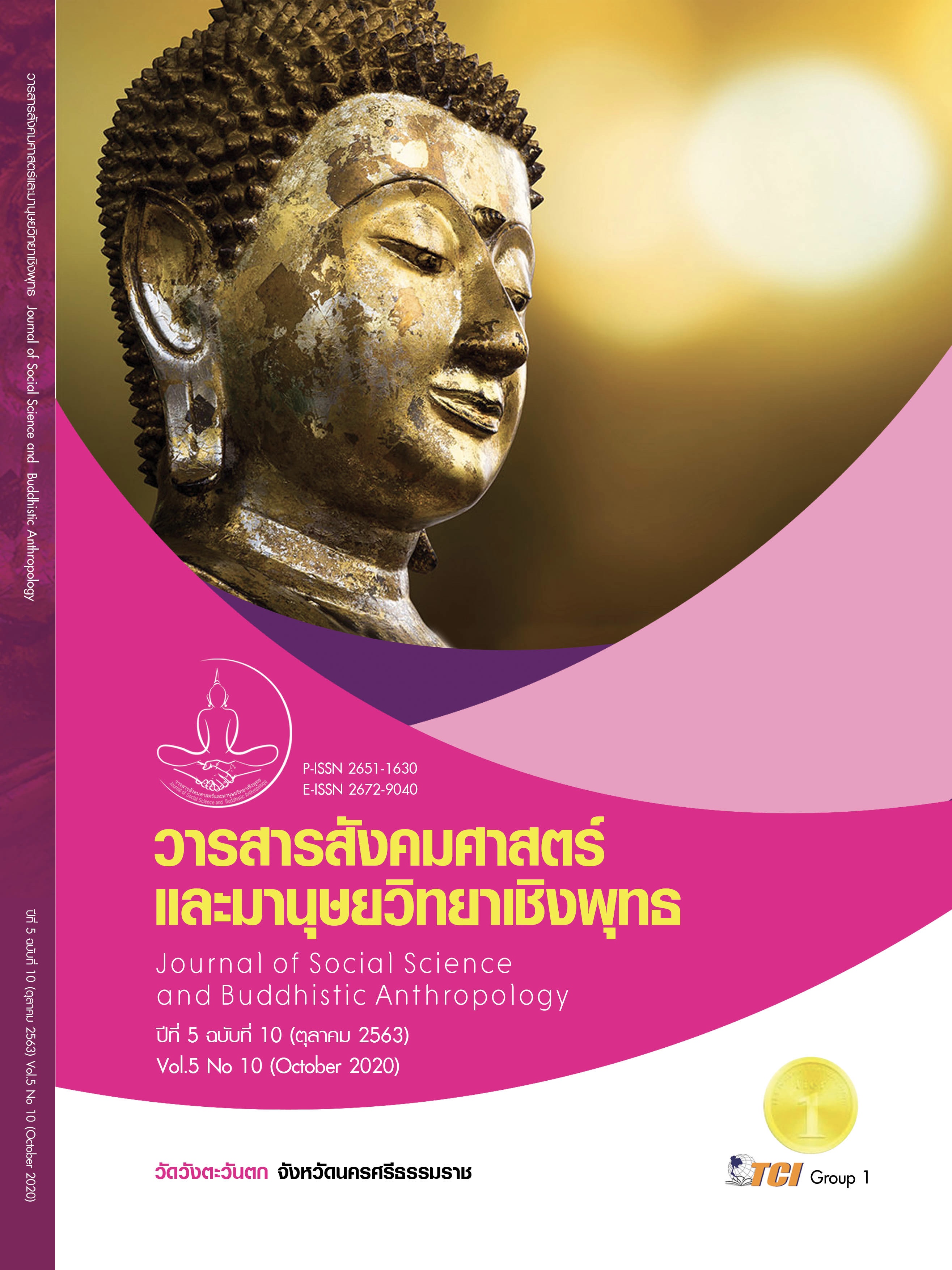Problem condition related to resilience and method to resilience enhancement of family caregiver and behavior to caring elderly with diabetes mellitus
Keywords:
Resilience Enhancement of Family Caregiver, Behavior to Caring, Elderly Diabetes Mellitus Patient, Family CaregiverAbstract
This qualitative research was to study 1) Problem and cause of resilience of family caregiver 2) Resilience enhancement method of family caregiver 3) caring Behavior elderly diabetes mellitus patients. Instrument the data was collected by In-depth interview with 6 family caregivers of the area in Nonthaburi province 6 District.The information form the interviews was then analyzed by content analysis. The research found that 1) Family caregivers have coped 2 Problems: Conflict with elderly with diabetes mellitus which mainly involves quantity adjustment the type of found and non - cooperation in treatment of patient and Adjust of daily life activities to be consistent caring elderly diabetes mellitus patient. Important causes that lead to resilience External causes are acquisition of facts about diabetes mellitus, Good cooperation from elderly diabetes mellitus patient get support from all around 2) Internal causes are self - esteem optimism. Method to resilience enhancement have 3 patterns 2.1) Created by self 2.2) Created by elderly with diabetes mellitus 2.3) Created by medical professionals. 3) Behavior to caring have 6 way 3.1) Support patients to be self - reliant 3.2) Live action to main caregiver of treatment plan and care to elderly 3.3) Positive communication 3.4) Have a part to treatment plan and time management 3.5) Showing to family by mot divided elderly diabetes mellitus patient 3.6) Facilitating daily life to elderly diabetes mellitus patient. The basic concept of problem and cause of resilience, resilience enhancement method and caring behavior to elderly diabetes mellitus patient, it has been used to in family caregivers, it has been used to take care for elderly diabetes mellitus patient.
References
กลุ่มพัฒนาระบบสาธารณสุข สำนักโรคไม่ติดต่อ. (2559). ประเด็นสารรณรงค์วันเบาหวานโลก ปี 2559. เรียกใช้เมื่อ 20 ตุลาคม 2559 จาก http://www.thaincd.com/document/file/info/non-communicable-disease/ประเด็นสารรณรงค์วันเบาหวานโลก_ปี_2559.pdf
กลุ่มพัฒนาระบบสาธารณสุข สำนักโรคไม่ติดต่อ. (2560). ประเด็นสารรณรงค์วันเบาหวานโลก ปี 2560. เรียกใช้เมื่อ 1 พฤศติกายน 2560 จาก http://thaincd.com/document/file/info/non-communicable-disease/ประเด็นสารรณรงค์วันเบาหวานโลกปี_2560.pdf
กองยุทธศาสตร์ และแผนงาน สำนักงานปลัดกระทรวงสาธารณสุข. (2561). สถิติสาธารณสุข พ.ศ. 2561. นนทบุรี: กระทรวงสาธารณสุข.
กิตติพัฒน์ นนทปัทมะดุลย์. (2554). การวิจัยเชิงคุณภาพในสวัสดิการสังคม (พิมพ์ครั้งที่ 2). กรุงเทพมหานคร: สำนักพิมพ์มหาวิทยาลัยธรรมศาสตร์.
ขวัญธิดา พิมพการ. (2561). การพัฒนารูปแบบการให้คำปรึกษารายบุคคลแบบบูรณาการเพื่อเสริมสร้างความเข้มแข็งทางใจของสตรีที่มีการสูญเสียสามีในสถานการณ์ความไม่สงบจังหวัดชายแดนภาคใต้. ใน ดุษฎีนิพนธิ์ปรัชญาดุษฎีบัณฑิต สาขาวิชาจิตวิทยาประยุกต์. มหาวิทยาลัยศรีนครินทรวิโรฒ.
เทียนทอง หาระบุตร และเพ็ญนภา แดงด้อมยุทธ์. (2556). ปัจจัยคัดสรรที่มีความสัมพันธ์กับพลังสุขภาพจิตของผู้ดูแลผู้ป่วยจิตเภทในชุมชน. วารสารการพยาบาลสุขภาพจิตและจิตเวช, 27(3), 113 - 124.
นวลฉวี ประเสริฐสุข. (2558). สื่อสารอย่างร้างสรรค์เพ่อสร้างสุขในครอบครัว. วารสารฉบับภาษาไทย สาขามนุษยศาสตร์ สังคมศาสตร์ และศิลปะ, 8(2), 737 - 747.
ผู้ให้ข้อมูลหลัก ท่านที่ 1. (2563). สภาพปัญหา สาเหตุ ของความเข้มแข็งทางใจ และวิธีการเสริมสร้างความเข้มแข็งทางใจและพฤติกรรมการให้การดูแลผู้สูงอายุโรคเบาหวานของผู้ให้การดูแลในครอบครัว. (ดลฤดี ทับทิม และคณะ, ผู้สัมภาษณ์)
ผู้ให้ข้อมูลหลัก ท่านที่ 2. (2563). สภาพปัญหา สาเหตุ ของความเข้มแข็งทางใจ และวิธีการเสริมสร้างความเข้มแข็งทางใจและพฤติกรรมการให้การดูแลผู้สูงอายุโรคเบาหวานของผู้ให้การดูแลในครอบครัว. (ดลฤดี ทับทิม และคณะ, ผู้สัมภาษณ์)
ผู้ให้ข้อมูลหลัก ท่านที่ 3. (2563). สภาพปัญหา สาเหตุ ของความเข้มแข็งทางใจ และวิธีการเสริมสร้างความเข้มแข็งทางใจและพฤติกรรมการให้การดูแลผู้สูงอายุโรคเบาหวานของผู้ให้การดูแลในครอบครัว. (ดลฤดี ทับทิม และคณะ, ผู้สัมภาษณ์)
ผู้ให้ข้อมูลหลัก ท่านที่ 4. (2563). สภาพปัญหา สาเหตุ ของความเข้มแข็งทางใจ และวิธีการเสริมสร้างความเข้มแข็งทางใจและพฤติกรรมการให้การดูแลผู้สูงอายุโรคเบาหวานของผู้ให้การดูแลในครอบครัว. (ดลฤดี ทับทิม และคณะ, ผู้สัมภาษณ์)
ผู้ให้ข้อมูลหลัก ท่านที่ 5. (2563). สภาพปัญหา สาเหตุ ของความเข้มแข็งทางใจ และวิธีการเสริมสร้างความเข้มแข็งทางใจและพฤติกรรมการให้การดูแลผู้สูงอายุโรคเบาหวานของผู้ให้การดูแลในครอบครัว. (ดลฤดี ทับทิม และคณะ, ผู้สัมภาษณ์)
ผู้ให้ข้อมูลหลัก ท่านที่ 6. (2563). สภาพปัญหา สาเหตุ ของความเข้มแข็งทางใจ และวิธีการเสริมสร้างความเข้มแข็งทางใจและพฤติกรรมการให้การดูแลผู้สูงอายุโรคเบาหวานของผู้ให้การดูแลในครอบครัว. (ดลฤดี ทับทิม และคณะ, ผู้สัมภาษณ์)
พัชรินทร์ นินทจันทร์ และคณะ. (2555). โปรแกรมการสร้างความแข็งแกร่งในชีวิต (A Resilience Enhancing Program). กรุงเทพมหานคร: จุดทอง.
มณีวรรณ สุวรรณมณี. (2556). ความสัมพันธ์ระหว่างพลังสุขภาพจิตกับการรับรู้ภาระการดูแลของผู้ดูแลผู้บาดเจ็บจากเหตุการณ์ความไม่สงบในจังหวัดชายแดนใต้ของไทย. ใน วิทยานิพนธ์พยาบาลศาตรมหาบัณฑิต สาขาวิชาการพยาบาลผู้ใหญ่. มหาวิทยาลัยสงขลานครินทร์.
รัถยานภิศ พละศึก และเบญจวรรณ ถนอมชยธวัช. (2560). ต้นแบบของครอบครัวในการดูแลผู้สูงอายุ. วารสารเครือข่ายวิทยาลัยพยาบาลและการสาธารณสุขภาคใต้, 4(3), 135 - 150.
สถาบันวิจัยระบบสาธารณสุข. (2551). เอกสารประกอบการประชุมเวทีระดมความคิดเห็น ต่อประเด็นนโยบาย เรื่อง “ระบบการดูแลและกำลังคนในการดูแลผู้สูงอายุ". กรุงเทพมหานคร: กระทรวงสาธารณะสุข.
สายพิณ เกษมกิจวัฒนา และปิยภรณ์ ไพรสนธ์. (2557). ญาติผู้ดูแลผู้ป่วยเรื้อรัง: กลุ่มเสี่ยงที่ไม่ควรมองข้าม. วารสารสภาการพยาบาล, 29(4), 22 - 31.
สำนักงานหลักประกันสุขภาพแห่งชาติ. (2559). คู่มือระบบการดูแลระยะยาวด้านสาธารณสุขสำหรับผู้สูงอายุ ที่มีภาวะพึ่งพิงในพื้นที่ (Long Term Care) ในระบบหลักประกันสุขภาพแห่งชาติ ปีงบประมาณ 2559. กรุงเทพมหานคร: สำนักงานหลักประกันสุขภาพแห่งชาติ (สปสช.).
สำนักพัฒนาสุขภาพจิต. (2555). คู่มืออบรมหลักสูตร การเสริมสร้างพลังสุขภาพจิต สำหรับสื่อมวลชนท้องถิ่น. นนทบุรี: บริษัท สานคิด จำกัด.
สุวิมลรัตน์ รอบรู้เจน. (2560). การพัฒนารูปแบบการดูแลสุขภาพผู้สูงอายุ สำหรับผู้ดูแลผู้สูงอายุ อำเภอวารินชำราบ จังหวัดอุบลราชธานี. วารสารมหาวิทยาลัยนราธิวาสราชนครินทร์, 9(3), 57 - 69.
เอกพงษ์ ณ เชียงใหม่. (2552). ผลการใช้กระบวนการกลุ่มต่อความรู้ ทัศนคติ และพฤติกรรมของ ผู้ดูแลผู้สูงอายุโรคเบาหวานชนิดที่ 2 ณ หน่วยบริการปฐมภูมิห้วยแหน จังหวัดลำพูน. ใน รายงานการวิจัย. มหาวิทยาลัยเชียงใหม่.
American Diabetes Association. (2015). Classification and Diagnosis of Diabetes. The journal of clinical and applied research and education Diabetes Care, 40(1), 11 - 32.
Corey, G. (2000). Theory and practice of group counseling (5th ed). Belment: Book/Cole/Thomson Learnig.
Grotberg, E. H. (1995). A guide to promoting resilience in children: Strengthening the human spirit. Netherlands: Bernard Van Lee Foundation.
Grotberg, E. H. (2003). Resilience for Today: Gaining Strength from Adversity. Greenwood: Praeger Publishers.
Matha, M. (1993). International Insittute for Management Development Lausanne. International Journal of Cross Cultural Management, 8(2): 123 - 143.
McCubbin, H. I. et al. (1979). Family Coping Inventory. Minnesota: University of Minnesota.
Miles, M. B. & Huberman, A. M. (1994). Qualitative Data Analysis: an Expanded Sourcebook (2nd ed). Thousand Oaks: Sage Publication.
Piper, B. F. et al. (1994). Fatigue mechanisms in cancer patients; Developing nursing theory. Oncology Nursing Forum, 14(6), 17 - 23.
Spence, A. et al. (2008). ctive carers: living with chronic obstructive pulmonary disease. International journal of palliative nursing, 14(8), 368 - 372.









